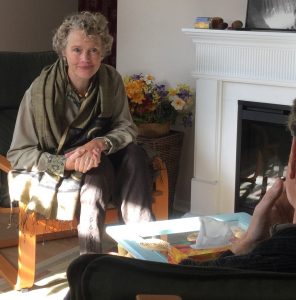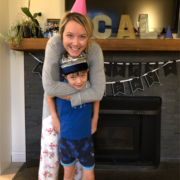Celiac Counsellor’s Corner – Sherry Scheideman, RCC
- ISSUE: My travel companions pressure me to make quick decisions and take risks when I need a snack from a convenience store. I feel hurt and disrespected.
 Celiac Counsellor’s Corner* is a place where Sherry Scheideman, M.A., Registered Clinical Counsellor, responds to your questions about the emotional and social issues that celiacs face. Diagnosed with celiac disease herself in 2001 in Victoria, BC, Sherry draws upon personal experiences and a Master’s Degree in Counseling to support you in transcending this ‘life transition’ and turning it into an opportunity to live your best life – ever.
Celiac Counsellor’s Corner* is a place where Sherry Scheideman, M.A., Registered Clinical Counsellor, responds to your questions about the emotional and social issues that celiacs face. Diagnosed with celiac disease herself in 2001 in Victoria, BC, Sherry draws upon personal experiences and a Master’s Degree in Counseling to support you in transcending this ‘life transition’ and turning it into an opportunity to live your best life – ever.
- Have you been struggling to adjust?
- CLICK HERE to leave a comment or ask Sherry a question
- Her replies are posted every Monday at 1pm PST on facebook.com/TheCeliacScene
RESPONSE
- Feeling hurt and disrespected is not the fun kind of experience you want to have when you’re travelling with your companions. It may seem like what needs to change in this scenario is their attitude, but your power is in working with your own attitudes, not theirs. You can do this by questioning your own beliefs.
Let’s identify one of your beliefs, and question it.
- In this scenario, you believe that your companions pressure you to take risks. I can imagine you in a convenience store, hungry for a snack, reading the labels on cookies and chips and crackers, with your companions picking things up and saying, “Why don’t you get this?”

- You read the label and point out that it says MAY CONTAIN WHEAT at the bottom, so you can’t have it; and they point at something else, saying, “What about that?” You see that it’s a deli package that has no ingredients listed on it at all, so you can’t have it.
- And then one of them triumphantly presents you with a cracker package that says GLUTEN FREE on it, and you have to explain that it has casein in it, which is milk protein, and (like many celiacs) you can’t have dairy either, so you can’t have it.
- And so on. Believing that your companions are pressuring you to take risks, each time they suggest something to you, you feel like they just want you to say yes to it and be done so they can move on to something more enjoyable. You feel anxious, you feel like a fun-wrecker, and you resent their lack of understanding and compassion.
What would it be like if it were impossible for you to believe that your companions are pressuring you to take risks?

- In the same scene at the convenience store, you’re reading labels, and your companions are making suggestions. You’re gratefully considering the things they’re suggesting, and when you point out why you can’t eat them, your companions are learning more about what being gluten-free really involves. This sounds like a very nice scenario!
- The only difference between this happy scene and the anxious scene above, is what you are believing. It’s great to know that you can question your stressful beliefs, and transform your experience.
But how can you protect yourself against believing damaging thoughts in the first place?

- Well, we tend to be taken over by negative beliefs more easily when we’re tired, stressed or hungry. So, you can make a habit of getting enough rest, not taking on too much stress, and ensuring that you tend to your nutritional needs before they flare up into true hunger. That’s called living with balance.
- Balance is healthy – everyone knows they should strive for it… but YOU have more incentive than most people, because your celiac condition really demands it. How wonderful! What a benefit this balance will be to your whole life. What a role model of balance you will be for your travel companions.
Thank you, Celiac Disease! And thank you for sharing. We all learn from your experience.
Sherry
- View previous Celiac Counsellor Corners enter ‘Sherry’ into the search field at the top right of this page

“Life happens! Why not love it?”
“Being diagnosed with celiac disease and going gluten-free has challenged me to develop inner resources that I never knew I had, and I’m grateful for that. As a counsellor, I love to help other celiacs find their own gifts within the challenges of the disease, and to facilitate healing. Why not let your celiac disease motivate you to be your best self?”
- About Sherry Scheideman
- What happens in a session?
- Not in Victoria? No Problem. Sherry does Skype
- Be inspired – Sherry’s Blog
- Sherry Scheideman on Facebook
- Contact Form
Sherry writes about the issues that we as celiacs face in Celiac Counsellor’s Corner. The following topics – and more – will be addressed:

- blaming ourselves or feeling guilty for having the disease
- feeling frustrated and sad about all the food we can’t have anymore
- facing social, familial, and workplace difficulties because we can’t eat what everyone else is having
- being afraid we might not be able to get anything safe to eat when we’re out
- having to ask endless questions about food to make sure we can eat it
- having to endlessly refuse offerings of food in order to stay safe
- occasionally getting “glutened” and then enduring not only the illness but possibly also the blame from ourselves
- how to handle gluten-free shaming
In her articles, Sherry will examine how we can feel like victims as we face the issues that celiac disease presents — and then will explore how these issues give us the opportunity to become our best selves as we rise to meet their challenges. We may find that we can even be grateful to celiac disease for giving us the challenges we need.
- As Pema Chodron notes, “When we reach our limit, a hardness in us will dissolve. We will be softened by the sheer force of whatever energy arises – the energy of anger, the energy of disappointment, the energy of fear. That very energy pierces us to the heart, and it opens us. Reaching our limit is like finding a doorway to sanity and the unconditional goodness of humanity.”
- *Information and perspectives provided in Celiac Counsellor’s Corner are intended to provide general information, without independent verification on the part of The Celiac Scene for the accuracy of the information provided to it. The information is specifically not intended to be a substitute for medical diagnosis or treatment by your physician or other health care professional. You should always consult your own physician or other health care professionals about any medical questions, diagnosis, or treatment, especially before trying any diet. The Celiac Counsellor’s Corner does not accept any liability for any injury, loss or damage incurred by use of or reliance on any content contained herein.













